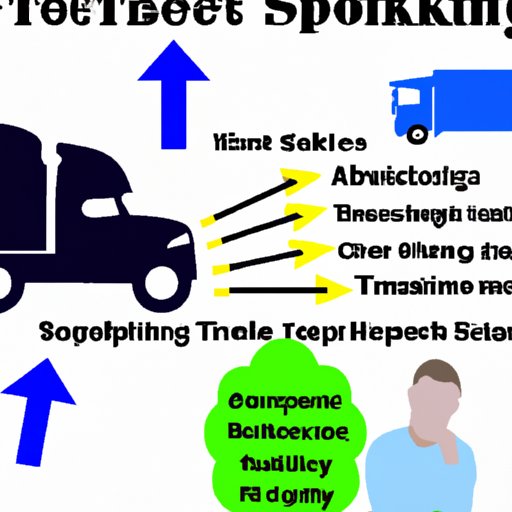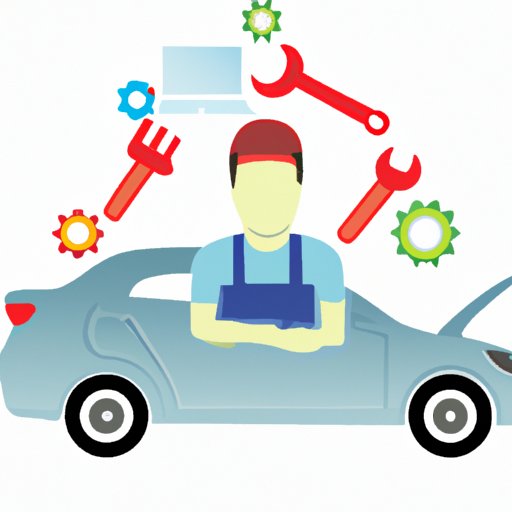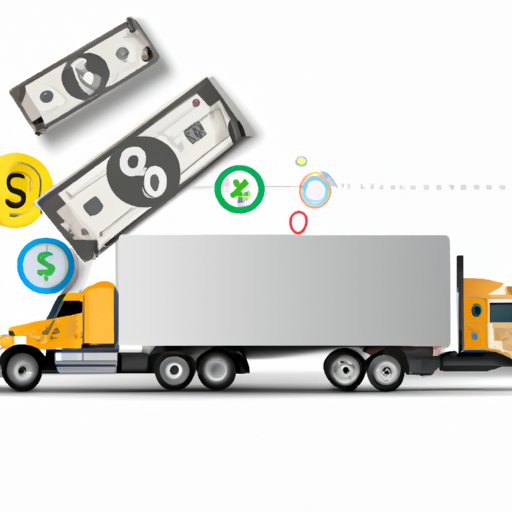Introduction
Starting a trucking business can be a daunting prospect, but with the right preparation and planning, it can also be a successful and profitable venture. Before getting started, it is important to understand the challenges that come with starting a trucking business and develop an action plan for success.

Overview of Challenges in Starting a Trucking Business
The trucking industry is highly regulated and requires a significant amount of capital to get started. New trucking businesses must comply with local, state, and federal laws and regulations, secure financing, purchase or lease vehicles, hire qualified drivers, and obtain necessary insurance coverage. Additionally, ongoing maintenance and repairs are essential for keeping vehicles in good working order and safe on the roads.
Purpose of the Article
This article provides an overview of the steps needed to start a trucking business. It covers topics such as researching local regulations and licensing requirements, establishing a business plan, securing funding, purchasing or leasing trucks, hiring professional drivers and mechanics, creating a maintenance schedule, and obtaining necessary insurance coverage. This information should serve as a helpful guide for anyone interested in starting a trucking business.
Research Local Regulations and Licensing Requirements
Before starting a trucking business, it is important to understand the rules and regulations for operating a trucking business in the area. Many states have specific laws and regulations regarding trucking companies, including requirements for licensing, safety inspections, and insurance coverage. Researching local regulations and licensing requirements can help ensure compliance with all applicable laws and help avoid any potential fines or penalties.
In addition to researching local regulations and licensing requirements, it is also important to obtain all necessary licenses and permits. These may include a motor carrier permit, a USDOT number, an International Fuel Tax Agreement (IFTA) license, and other permits required by the state or local government. Securing these licenses and permits can be a lengthy process, so it is important to start early and allow plenty of time to complete the paperwork.
Establish a Business Plan
Once the necessary licenses and permits have been obtained, the next step is to create a business plan. A business plan should include a mission statement, goals and objectives, financial projections, and a marketing plan. It should also include a detailed budget that takes into account all costs associated with running a trucking business, such as vehicle expenses, fuel costs, and salaries for drivers and mechanics.

Secure Funding to Start the Business
Securing sufficient funding is one of the most important steps in starting a trucking business. There are several sources of capital available, including personal savings, investments, loans from banks or private lenders, and government grants and loans. Each source of funding has its own advantages and disadvantages, so it is important to research each option carefully before making a decision.
Purchase or Lease Trucks
The next step is to purchase or lease trucks for the business. It is important to assess the type of equipment needed for the business, such as flatbeds, box trucks, refrigerated trucks, and tankers. Once the type of equipment is determined, it is then necessary to compare the cost of purchasing versus leasing the trucks. Depending on the size of the business and the budget, it may be more cost-effective to lease rather than purchase the trucks.

Hire Professional Drivers and Mechanics
Once the trucks have been purchased or leased, the next step is to hire professional drivers and mechanics. It is important to identify the qualifications and skills needed for these positions and research the average salaries and benefits offered in the area. Hiring experienced and qualified drivers and mechanics can help ensure the safety of the vehicles and the quality of service provided to customers.
Create a Maintenance Schedule
Creating a maintenance schedule is essential for keeping the vehicles in good working order and safe on the roads. The maintenance schedule should include regular safety checks, oil changes, tire rotations, and other routine maintenance tasks. It is also important to monitor the performance of the vehicles to identify any issues and make necessary repairs.
Obtain Necessary Insurance Coverage
The final step in starting a trucking business is to obtain the necessary insurance coverage. It is important to identify the types of insurance required by law and compare insurance providers to find the best coverage at the most affordable rate. Common types of insurance for trucking businesses include general liability, cargo insurance, and commercial auto insurance.
Conclusion
Starting a trucking business can be a challenging but rewarding endeavor. By understanding the challenges and taking the necessary steps, such as researching local regulations and licensing requirements, establishing a business plan, securing funding, purchasing or leasing trucks, hiring professional drivers and mechanics, creating a maintenance schedule, and obtaining necessary insurance coverage, entrepreneurs can set themselves up for success.
(Note: Is this article not meeting your expectations? Do you have knowledge or insights to share? Unlock new opportunities and expand your reach by joining our authors team. Click Registration to join us and share your expertise with our readers.)
